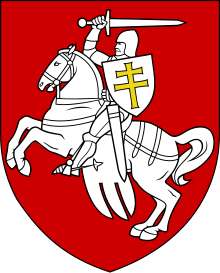

Belarusian nationalism refers to the belief that Belarusians should constitute an independent nation. Belarusian nationalism began emerging in the mid-19th century, during the January Uprising against the Russian Empire. Belarus first declared independence in 1917 as the Belarusian Democratic Republic, but was subsequently invaded and annexed by the Russian Soviet Federative Socialist Republic in 1918, becoming part of the Soviet Union. Belarusian nationalists both collaborated with and fought against Nazi Germany during World War II, and protested for the independence of Belarus during the late 1980s and early 1990s.
Belarusian nationalism has historically been divided into two groups; pro-western and pro-Russian. These different groups have continually sought to take control from the other since the early 1860s. These groups are additionally divided along religious lines, with Catholics belonging to the pro-western camp and Eastern Orthodox Christians belonging to the pro-Russian. Various historical attempts have been made to unite Belarus under a singular religion, including the Ruthenian Uniate Church before 1917 and Protestantism in the 1920s, though these efforts all fell flat.
In Belarus, Belarusian nationalism is a controversial position. The government of Alexander Lukashenko has vacillated between promoting pro-Russian Belarusian nationalism and unification with Russia. Pro-western Belarusian nationalists have been tied to Axis collaboration with Nazi Germany by the government in an effort to discredit the Belarusian opposition and legitimize Lukashenko's rule. The pro-western group has countered Lukashenko's claims by associating themselves with the Belarusian resistance during World War II.
- ^ Walker, Shaun (22 August 2020). "How the two flags of Belarus became symbols of confrontation". The Guardian. Retrieved 4 November 2023.